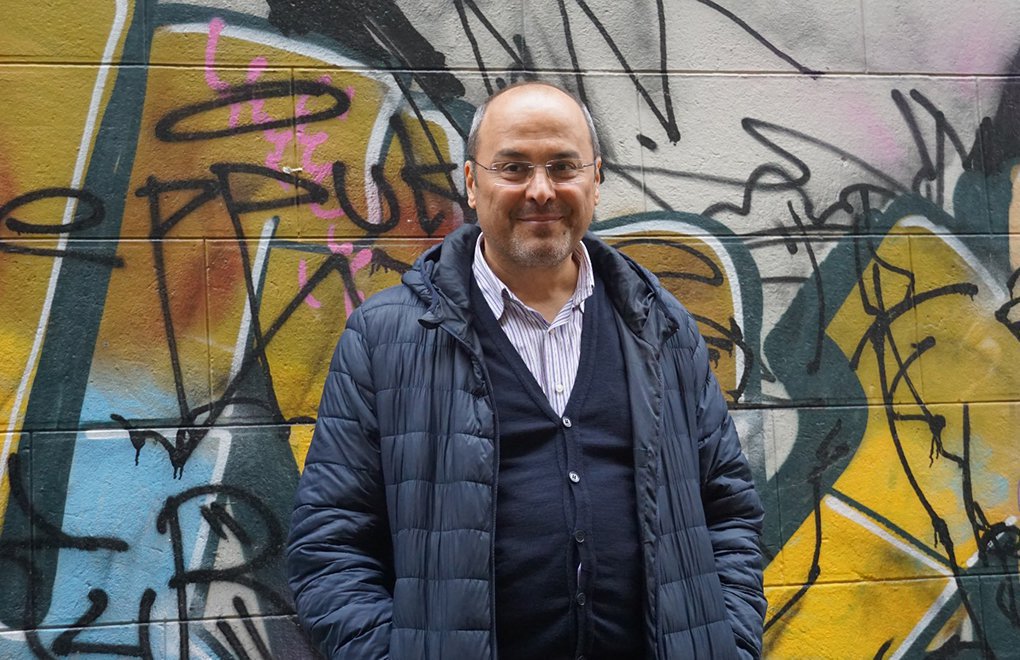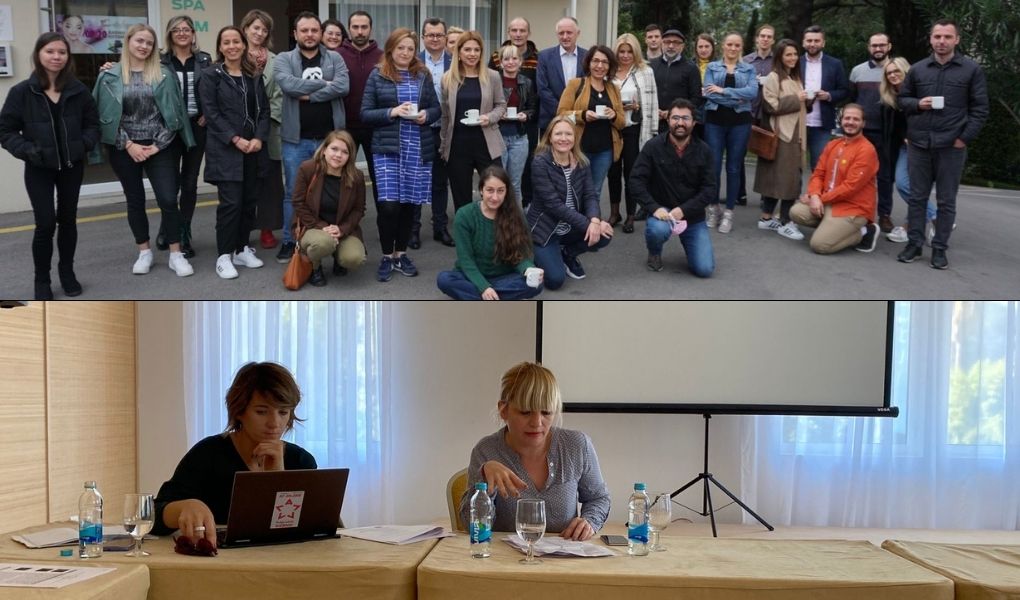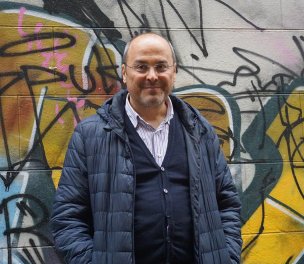MESA sends an open letter to President Erdoğan for Bülent Şık

* Bülent Şık. Photo: Yağmur Karagöz/bianet.
Click to read the article in Turkish
The petition launched for bianet columnist and Food Engineer Asst. Prof. Bülent Şık is drawing to an end. Şık was previously sentenced to 1 year, 3 months in prison on the ground that the shared the results of Health Ministry's cancer research with the public.
In this context, Middle East Studies Association (MESA) President Prof. Dina Rizk Khoury from George Washington University and Chair of Committee on Academic Freedom Prof. Laurie Brand from University of South Carolina have sent an open letter to President and ruling Justice and Development Party (AKP) Chair Recep Tayyip Erdoğan and senior state officials.
Underlining the importance of public health and people's right to get information, the full letter of the MESA is as follows:
Dear President Erdoğan:
"We write on behalf of the Middle East Studies Association (MESA) of North America and its Committee on Academic Freedom to express our deep disappointment with your government's continued targeting of Professor Bülent Şık, whose research focuses on public health, food safety and the right to a healthy environment, and who was given a prison sentence for making public his research on industrial pollution.
"The persecution of Professor Şık is symptomatic of your government's disregard for both academic freedom and public health. The treatment of Professor Şık sends a chilling message that your government prioritizes profits over the lives and rights of Turkish citizens.
"MESA was founded in 1966 to promote scholarship and teaching on the Middle East and North Africa. The preeminent organization in the field, the Association publishes the International Journal of Middle East Studies and has nearly 2500 members worldwide. MESA is committed to ensuring academic freedom and freedom of expression, both within the region and in connection with the study of the region in North America and elsewhere.
"We wrote to you, in a letter dated 21 March 2019, when Prof. Şık was first targeted for publishing his findings on contamination of soil, food, air and water by carcinogenic industrial chemicals in Antalya, Ergene, and Dilovası.
"Between 2011 and 2016, he took part in a study launched by the Ministry of Health that yielded disturbing findings that the Ministry suppressed and hid from the public. After several years of waiting for the Ministry to address the findings, Professor Şık decided to unilaterally disclose those that concerned the cancer risks posed by toxic pollution in western Turkey.
"On 15-18 April 2018, he made public the findings of the study, including a map of carcinogenic contamination based on his research. The Ministry of Health filed a lawsuit against Şık alleging that he had disseminated "classified information" and that the disclosure was unauthorized, in violation of his duties of confidentiality. On 26 September 2019, he was sentenced to 15 months in prison for "disclosing classified information." He was acquitted on the count of "obtaining classified information" without due authorization. Professor Şık is appealing the sentence.
'Public has the right to be informed'
"While obligations to maintain confidentiality may pertain to some forms of government-funded research, the public has a right to be informed of findings that indicate an urgent risk to public health.
"Rather than suppressing the findings and prosecuting Prof. Şık, Ministry of Health should be taking urgent action to address environmental pollution and protect public health. The dramatic increase in cancer diagnoses in the affected regions attests to the importance of Prof. Şık's findings.
"The prosecution of Professor Şık under these circumstances is not only a violation of his academic freedom, but also indicative of your government's worrisome indifference to public health.
'It confirms broader pattern of persecution'
The case of Professor Şık confirms the broader pattern of persecuting academics perceived to be critics of your government whether based on their advocacy of Kurdish rights or criticisms of industrial policies that advance the interests of corporate sectors supportive of your government. (See our letters dated 12 December 2012 and 30 October 2015).
"For example, former Chair of the Department of Public Health at Kocaeli University, Professor Onur Hamzaoğlu, was similarly targeted by your party's officials for revealing his research findings, which also documented carcinogenic industrial pollution in the same region, Dilovası, studied by Professor Bülent Şık.
"At the time, the AKP mayors of Kocaeli and Dilovası filed a lawsuit against Professor Hamzaoğlu on grounds of alleged "academic misconduct" for publishing his research findings and thereby purportedly inciting public panic.
"Our earlier letters also document the case of Prof. Beyza Üstün, targeted for disciplinary investigation as she published her research on public health impact of hydroelectric power plants (see our letter dated 30 October 2015).
"While these scholars have been penalized for their work on the adverse health impacts of your government's environmental and industrial policies, academics supportive of such policies, like the Rector of Ankara University, Erkan İbiş, were celebrated for promoting dubious research on the safety of nuclear energy (see our letters dated 12 December 2012, 12 January 2017 and 16 February 2017).
'Targeting of professionals is shocking'
"Our letters over the last four years have clearly documented your government's strategy of using emergency decrees and prosecutions to silence academics whose research or views have been deemed unsupportive of your government's policies, and to manipulate anti-terror laws as a means to repress critical scholarship and stifle dissent.
"The fact that these policies are being adopted in the midst of a pandemic speaks volumes about your government's priorities. At a time when government obligations to protect public health have become clearer than ever, your government's targeting of professionals who disclose risks to public health, including the case of Professor Şık, is shocking.
"As a member state of the Council of Europe and a signatory of the European Convention for the Protection of Human Rights and Fundamental Freedoms, Turkey is required to protect academic freedom, which is grounded in the freedom of thought, expression and assembly.
"Turkey is also a signatory to the Universal Declaration of Human Rights, the International Covenant on Civil and Political Rights, and the Final Act of the Conference on Security and Cooperation in Europe (OSCE), all of which protect the rights to freedom of expression and association, which are at the heart of academic freedom. These rights are also enshrined in articles 25-27 of the Turkish Constitution. Lastly, Turkey is a signatory of the International Covenant on Economic, Social and Cultural Rights, which includes obligations to both protect Turkish citizens' rights to the highest attainable standard of physical and mental health and to "respect the freedom indispensable for scientific research." (Article 15(3)).
'Desist from repressing academic freedom'
"Once again, we respectfully urge your government to desist from repressing academic freedom and freedom of expression for scholars and researchers.
"In particular, we call on your government to halt the prosecution of scholars whose research reveals the negative effects of its policies in areas including, but not confined to, public health and environmental regulation, to drop all charges against Professor Şık, and to cease your government's campaign of harassment against professional and academic organizations.
"The freedom to conduct the research necessary to identify risks, mitigate harms and offer protections for public health is essential to your government's capacity to meet its most basic obligations. The changes we respectfully request would send the message to your citizens and Turkish scientific community that you prioritize the protection of public health and academic freedom over partisan political or economic gains.
"Thank you for your attention to this matter. We look forward to your positive response."
Sincerely,
Dina Rizk Khoury
MESA President
Professor, George Washington University
Laurie Brand
Chair, Committee on Academic Freedom
Professor, University of Southern California
(PT/SD)
RESILINCE IN JOURNALISM ARTICLES - 7
Disinformation and toxification of news

TEN AMBASSADORS SUMMONED
Turkey's axis is shifting in foreign policy, human rights, says former ambassador

EDITORS FOR TRUST FORUM
Laws and sausages

'EXECUTION LIST'
DJV demands an end to Turkey's 'fight against press freedom'

HDP & DEMOCRACY IN TURKEY
HRW Director: An attack on rights of millions of voters
.jpg)




.jpg)


